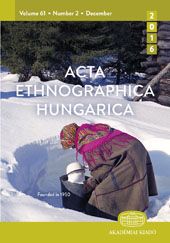ENTSTEHENDE LANDSCHAFT, WECHSELNDE GESELLSCHAFT UND KULTUR ZUR ETHNOGRAPHIE DES BODROGKÖZ (NORDOSTUNGARN) IM 19.–20. JAHRHUNDERT
CHANGING COUNTRYSIDE, SOCIETY AND CULTURE. CONTRIBUTION TO THE ETHNOLOGY OF THE BODROGKÖZ REGION OF NE HUNGARY IN THE 19TH–20TH CENTURIES
Author(s): Gyula VigaSubject(s): Cultural history, Regional Geography, Cultural Anthropology / Ethnology, 19th Century
Published by: Akadémiai Kiadó
Keywords: Bodrogköz (North-east Hungary); transformation of the countryside; deforestation; regulation of rivers; peasant embourgeoisement; border regions;
Summary/Abstract: Bodrogköz is a historical region comprising some fifty settlements divided by the redrawing of the borders after the First World War: the northern part is now in the territory of Slovakia and the southern part in Hungary. The appearance of the countryside bordered by the Tisza, Bodrog and Latorca rivers was substantially changed by the deforestation and later, between 1845 and 1890, by the regulation of the rivers and flood control measures. The essay examines how the transformation of the landscape influenced the historical processes of peasant farming, the society and culture. Under its influence the earlier difference between the flood plains and the flood-free levels ceased to exist and there was a considerable overall increase in the proportion of ploughland. However, there was a marked decline in the area of grazing land that had provided the fodder for the earlier extensive livestock farming. With considerable differences between villages, the structure of peasant farms shifted towards keeping cattle in barns and in agriculture the role of fodder production greatly increased. The changes percolated through peasant society very slowly: a substantial part of the population continued to farm on infertile land. Many people sought prosperity in America and used the money earned there to buy land in their Bodrogköz settlements. The hierarchy of settlements in the region was also greatly altered by the transformation of the countryside. However, the region as a whole remained disadvantaged and the development of its society is still contradictory even today.
Journal: Acta Ethnographica Hungarica
- Issue Year: 53/2008
- Issue No: 2
- Page Range: 315-325
- Page Count: 11
- Language: German
- Content File-PDF

